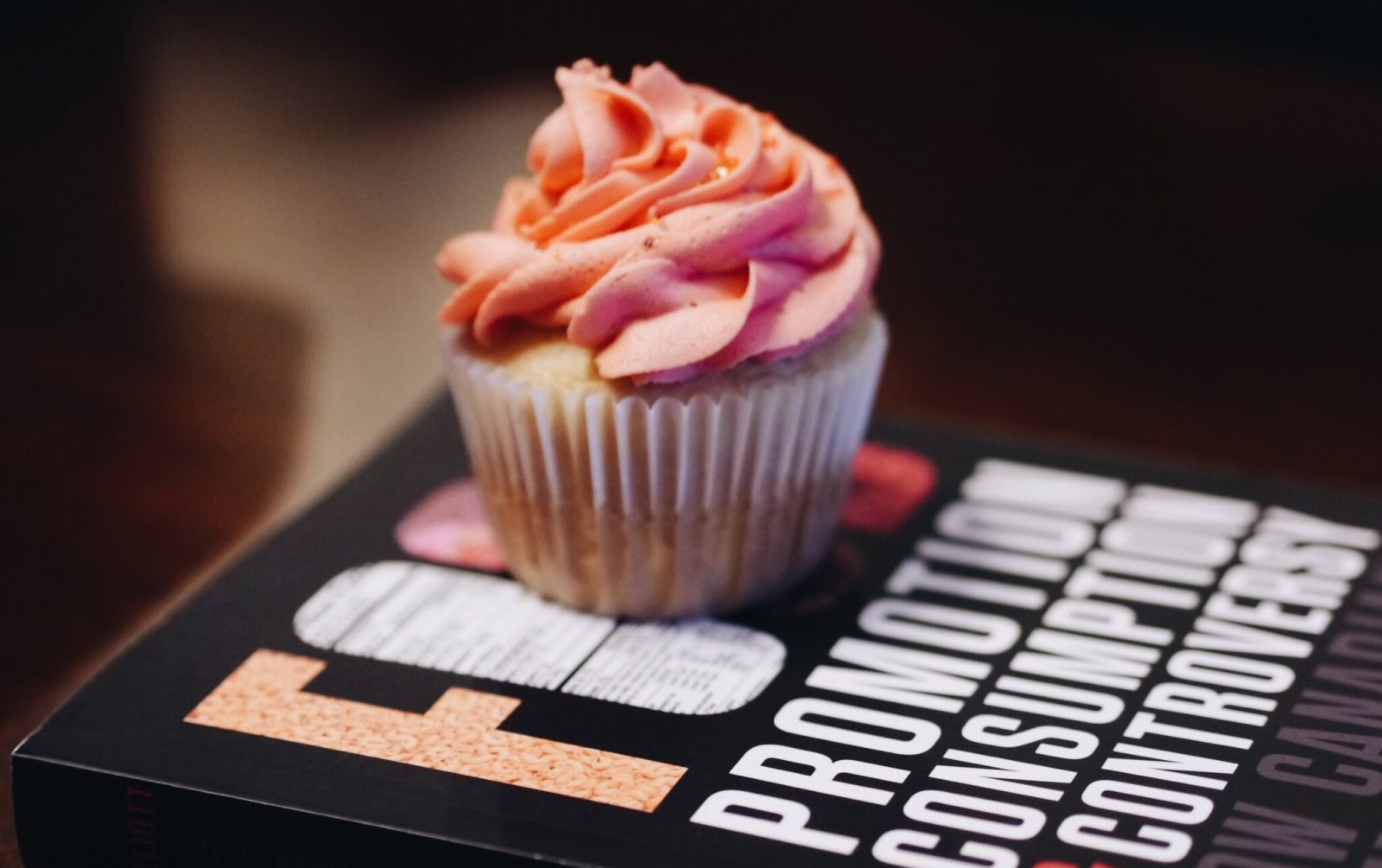“Cupcakes. The end is clearly near,” says Anthony Bourdain in an episode of The Layover. It’s clear, the man hates cupcakes. But what’s so bad about cupcakes and what does Bourdain’s rejection of them say about masculinity and food? For National Cupcake Day, we’re sharing Irina Mihalache’s investigation into the matter. This excerpt appeared in her chapter in How Canadians Communicate VI: Food Promotion, Consumption, and Controversy. You can read the whole chapter for free here.
Of Men and Cupcakes: Baking Identities on Food Network
Anthony Bourdain hates cupcakes. When asked by the Seattle Times to comment on the cupcake craze in North America, Bourdain said, with gravity and annoyance, “Enough” (Tsong 2009). In fact, Bourdain’s dislike for cupcakes is not a surprise for those familiar with his type of performed masculinity: edgy, rough, mysterious, and characterized by “a rejection of domesticity” (Ashley et al. 2004, 165). For Bourdain, endorsing cupcakes—the quintessential symbol of domestic femininity—would act against his performed identity, which has been carefully crafted through various media, from books to reality television. Yet, despite the chef’s dissatisfaction with the frosted dessert, the cupcake remains a very powerful presence within the North American foodscape and in various Food Network kitchens.
Bourdain’s comment on cupcakes is a suitable entryway into discussions about food, representation, and identity because it highlights the fluidity with which a culinary cultural object such as the cupcake can circulate within multiple registers of meaning and inform diverse identities. If, for Bourdain, the cupcake represents a culinary joke and the sum of many things he dislikes—daintiness, domesticity, and nostalgia—for other celebrity and noncelebrity chefs who perform on television, the cupcake can be deconstructed and reassembled in order to signify a range of things—from retro domesticity to hypermasculinity. Therefore, I argue that the baking of cupcakes on food television, specifically Food Network, represents an informal pedagogical moment in the complex and contradictory process of identity making.
Building on the cupcake’s flexible identity, this chapter suggests that the social and cultural value of food television resides in its role of informal educator on matters of performed identities, belonging, and taste. Even if a food show does not specifically instruct the viewer how to cook—which, for some scholars, is problematic because of its lack of immediate educational value—it nonetheless presents multiple entryways into informal learning about processes such as performing the self, negotiating a sense of belonging, and endorsing a specific taste culture or more. In a nutshell, food television contributes to our identities through its various messages about food and cooking. Likewise, food shows borrow from and inform everyday food-related practices, constantly reinforcing and challenging collective identities and taste communities. In my view, the cupcake is well positioned to function as an example of this exchange because it has been co-opted by a multitude of gendered identities, from the vegan pin-up girl to the overtattooed male hipster, and it has been transformed to suit these diverse and often contradictory identities.
Starting from the argument that food television acts as an informal educator in matters of identity and belonging, this chapter explores the transformation of the cupcake from an overtly feminine item associated with an idealized form of domesticity into an almost gender-neutral dessert that can be freely co-opted by men. The cupcake is a rather unexpected object for the shaping of masculinity, given the very powerful bond between cupcakes and feminine aesthetics. At the same time, the playful, spectacular, and versatile nature of the cupcake allows it to function as an empty canvas for the performance of different types of masculinity. The ingredients, decoration, and plating of the cupcake, together with the material culture surrounding both the food and the body of its maker, contribute to different registers of identity that are “taught” through food programming. In this chapter, I address how aspects of cupcake culture have permeated the kitchens of two Food Network male celebrity chefs, Chuck Hughes and Alton Brown, who are as comfortable scooping buttercream frosting onto a cupcake as they are grilling a steak. I suggest that each cupcake reflects the identity of the chef, who, at the same time, is representative of wider taste cultures. My discussion contributes to an underexplored perspective on food television—the value of cooking shows as informal education—and highlights the cultural significance of the cupcake as a marker of identity. In addition, the chapter traces the process of the cultural co-option that transforms the cupcake from a symbol of domestic femininity to a dessert that is “safe” for men. […]
References
Ashley, Bob, Joanne Hollows, Steve Jones, and Ben Taylor. 2004. Food and Cultural Studies. New York: Routledge.
Tsong, Nicole. 2009. “Chef Bourdain Talks about Seattle’s Magical Food Scene, Batali Envy, and More.” Seattle Times, 27 May.


